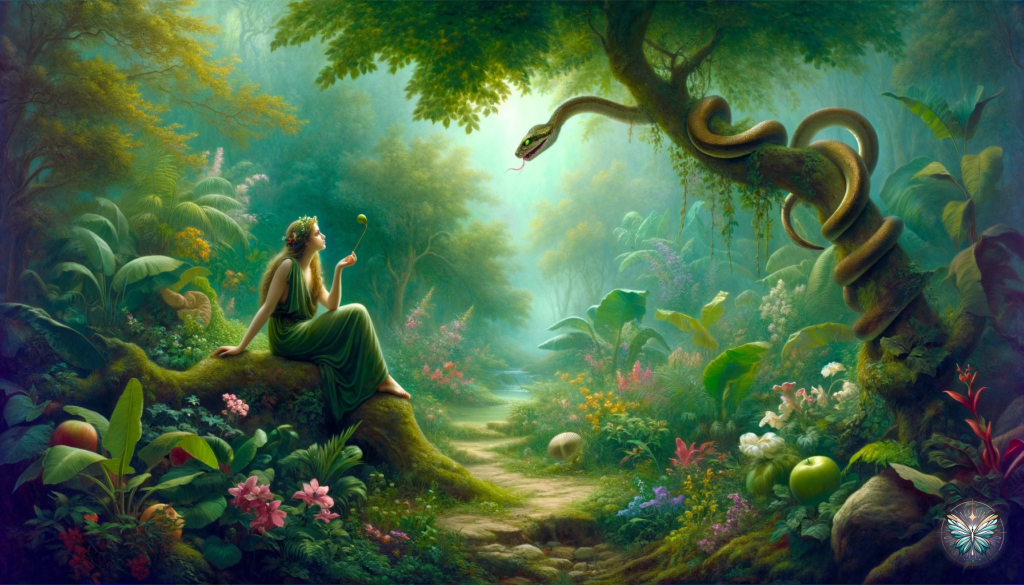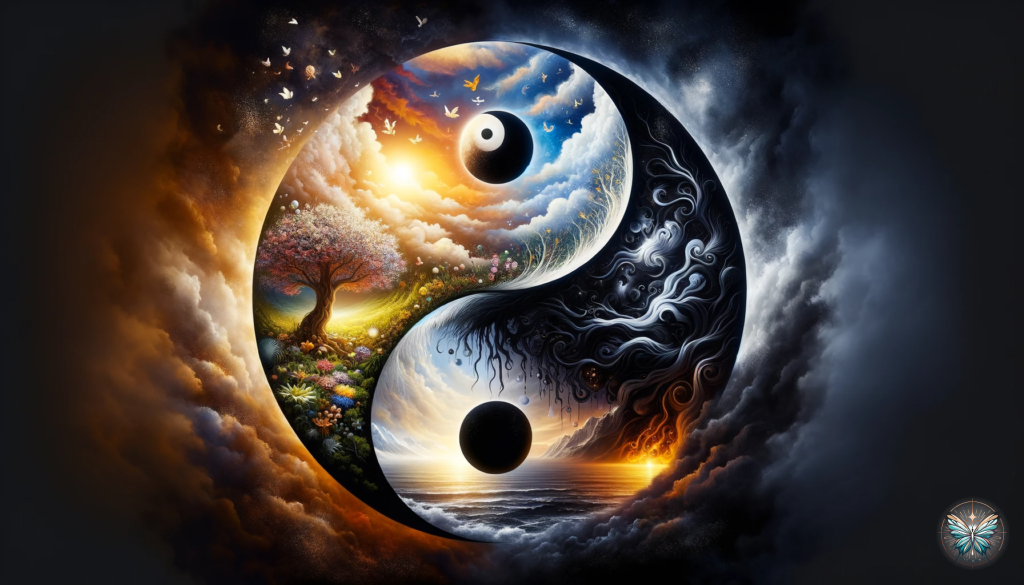Is it possible to have negative or malevolent spirit guides?
The question of whether negative or malevolent spirit guides exist depends on your interpretation, which leads us into examine the intricate and complex world of spiritual beliefs and experiences; to consider the deeper aspects of our spiritual journeys, intertwining philosophical concepts of duality and the nature of guidance itself.
It would be naive of us think there is a clear cut answer, but like much in life it is multifaceted as we will soon discover..
The Nature of Duality in Spirit Guides:
- If we accept that everything has a polar opposite, how does this shape our perception of spiritual guidance? Could the challenges and negative experiences we encounter are not just obstacles, but essential parts of our journey? So if there’s light, must there also be darkness, and what role does this darkness play in our growth?
- In a universe governed by duality, it could be that spirit guides also embody this polarity? This might mean that just as there are guides who assist and nurture our spiritual growth, there could be entities that challenge us, forcing us to confront our fears and weaknesses. These ‘negative’ guides could be essential for a balanced spiritual experience.

Growth Through Adversity:
- Consider the notion that what we perceive as malevolent forces might actually serve a crucial purpose. Can adversity be a more effective teacher than comfort and ease? What if the difficulties attributed to negative forces are actually catalysts, pushing us toward our higher selves? Consider for a moment, how do our struggles shape us, and could they be just necessary for profound spiritual growth?
- Challenges and adversities might be the most effective tools for personal and spiritual growth. What we perceive as negative influences could actually be pushing us to develop resilience, self belief and wisdom, serving as tough but necessary teachers on our journey to our higher selves.
Interpretation of Spiritual Experiences:
- How much of our spiritual experience is colored by our perceptions and beliefs? When we encounter what we think are negative forces, are we facing external entities, or are we confronting aspects of our own psyche? Could these experiences be mirrors reflecting our fears, doubts, and unresolved issues?
- Our perception of malevolent forces might indeed be a reflection of our inner fears or unresolved issues. But could these experiences could be less about external entities and more about our internal struggles, acting as mirrors to help us understand and heal our deeper selves.
Assigning Blame for Our Choices:
- Are we as humans predisposed to assign blame? Could it be that in our quest to understand and cope with life’s challenges, we designate these spirits guides as scapegoats for our misfortunes, unwise choices and to protect our ego?
- Are these entities truly external forces influencing our lives, or are they convenient projections of our own fears and shortcomings? When we encounter adversity, might we be too quick to attribute it to malevolent spiritual influence rather than confronting our own failings or the random nature of life?
- Could the concept of negative spirit guides serve as a buffer, absolving us from the discomfort of self-examination and the acceptance of personal responsibility? In essence, are these spirits merely reflections of our innate tendency to externalize blame, offering us an ‘out’ from facing the often complex and multifaceted reality of our decisions in life.
Free Will and Personal Responsibility:

- If free will is central to our spiritual journey, what does this imply about the role of malevolent forces? Do these forces merely present choices, leaving the power of decision in our hands? How does the concept of personal responsibility fit into this framework, especially when we face difficult or seemingly negative influences?
- The presence of negative forces could be an integral part of the spiritual landscape, offering choices and lessons. Our response to these forces might be the true test of our character and spiritual maturity, highlighting the importance of personal responsibility and discernment.
Contrast as a Means of Understanding:
- If we never knew sorrow, would we truly appreciate joy? Does the existence of negative experiences enhance our understanding and appreciation of the positive? How do our encounters with adversity inform our understanding of what aligns with our higher selves and what does not?
- Experiencing negative forces or challenging situations might indeed enhance our appreciation and understanding of the positive. These experiences could be a vital part in helping us discern what aligns with our higher self, acting as a necessary contrast to guide our spiritual evolution.
Cultural and Historical Contexts:
- Has different cultures and historical periods influenced our understanding of negative spiritual entities? Are these entities universally seen as malevolent, or do they sometimes serve a greater purpose in the cosmic narrative? How do these cultural lenses shape our personal spiritual journeys?
- The varied interpretations of malevolent entities across cultures and histories might suggest that these beings serve a broader purpose in the human spiritual narrative. They could represent the universal struggle between light and darkness, good and evil, However, as most things in life its rarely just black or white!
The Role of Fear and Projection
- To what extent are our fears and projections responsible for our interpretation of spiritual experiences? When we encounter what we perceive as malevolent forces, are we projecting our inner turmoil onto these experiences?
- Could it be that our fears manifest as external challenges? What if these experiences are less about external entities and more about confronting and learning from our own shadow aspects. Teaching us more about ourselves than any external guide could.
The Balance of Positive and Negative:

- In a world where positive and negative forces are in constant interplay, what is the true nature of balance? Is a state of complete positivity desirable, or even possible? How do these opposing forces maintain a dynamic equilibrium in our lives and in the universe?
- In the interplay of positive and negative forces, could balance be about embracing both? Should we instead view the positive and negative more as Yin and Yang? Two opposing, yet complementary forces that are interconnected and interdependent. Suggesting that a harmonious existence requires acknowledging and integrating these opposing forces, rather than striving for a state of unattainable perpetual positivity.
The Evolution of the Soul:
- Lets think about the soul’s journey for a moment; how does the so-called negative experiences contribute to its evolution? Could it be that our souls need these experiences just as much as they need the positive ones?
- But what lessons can be learned in the face of adversity? Might it be that the soul’s evolution is intricately linked to its journey through both positive and negative experiences. And is it possible that facing adversity is as crucial as experiencing joy, and that each type of experience imparts it own unique and indispensable lesson?
Reframing Challenges as Opportunities:
- If we start viewing challenges not as hindrances but as opportunities for growth, how does this shift our spiritual perspective? Can embracing adversity, rather than resisting it, lead us to a deeper understanding and connection with our higher selves.
- Finally, is it time to redefine what we mean by malevolent forces? Instead of seeing them as purely harmful, should we be viewing them as complex elements in the tapestry of our spiritual existence, each with a role to play in our overall growth, understanding and enlightenment?
Redefining the Negative for Growth:
The idea of negative spirit guides or malevolent forces challenges us to reconsider the nature of guidance itself. In a universe where everything is interconnected and every action has a reaction, the role of these forces could be to prompt introspection, resilience, and a deeper questioning of our beliefs and values. They might not guide us in the traditional sense of offering support and wisdom but guide us through opposition, pushing us to strengthen our spiritual fortitude and discernment.
In essence, the metaphysical perspective on malevolent forces or “anti-guides” opens a gateway to a more profound understanding of the spiritual journey. It compels us to embrace the full spectrum of our experiences, recognizing that enlightenment might not just be a process of ascending towards light but also of navigating through and understanding the darkness. This holistic approach fosters a more balanced and mature spiritual growth, where wisdom is born not only from guidance but also from adversity and challenge.
Thank you for joining me on this exploration into whether we can have negative spirit guides. Your thoughts and experiences are valuable to us, so feel free to reach out or leave a comment. Until next time, stay positive, keep exploring, and remember, every step on your journey is an opportunity for growth and deeper understanding.
